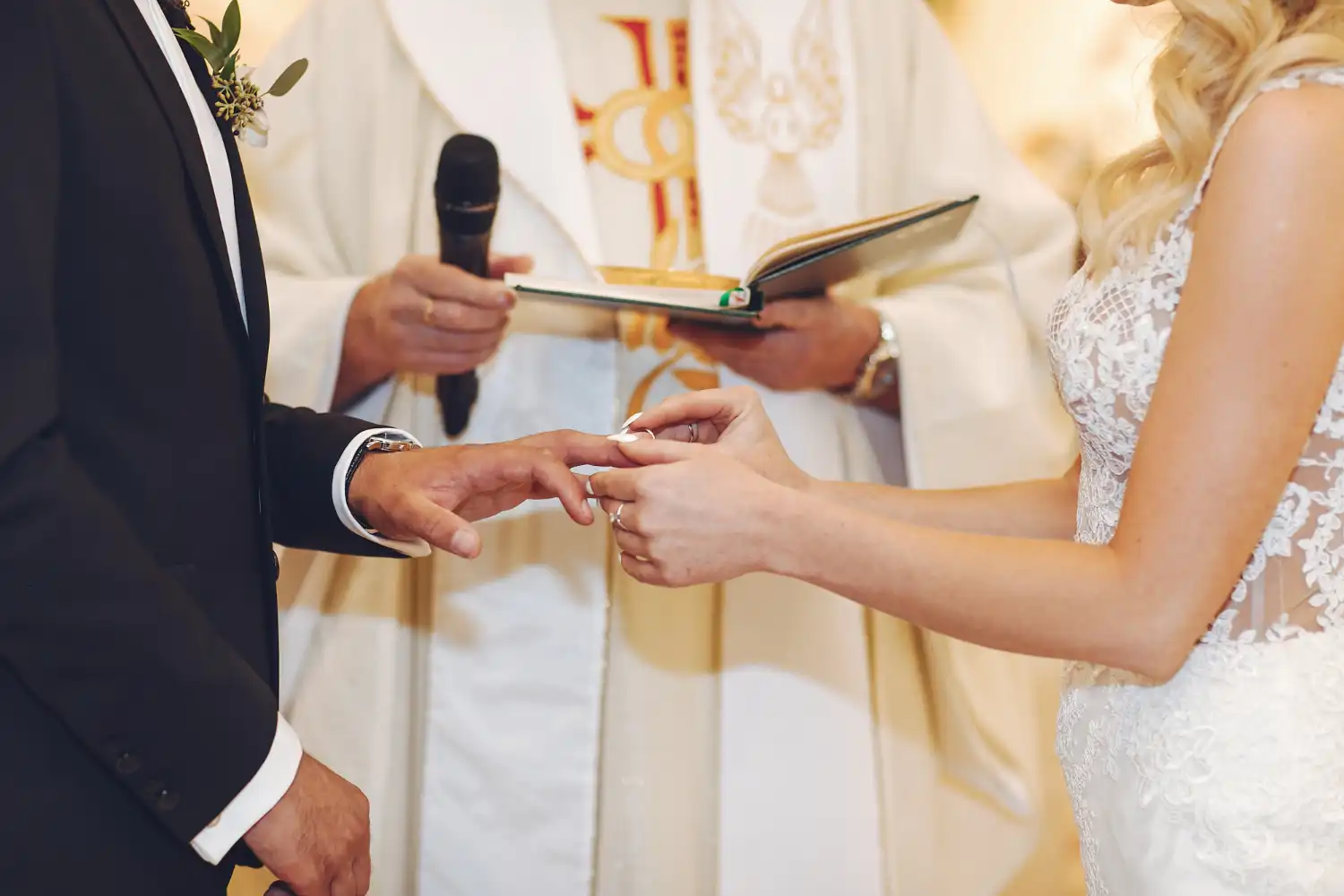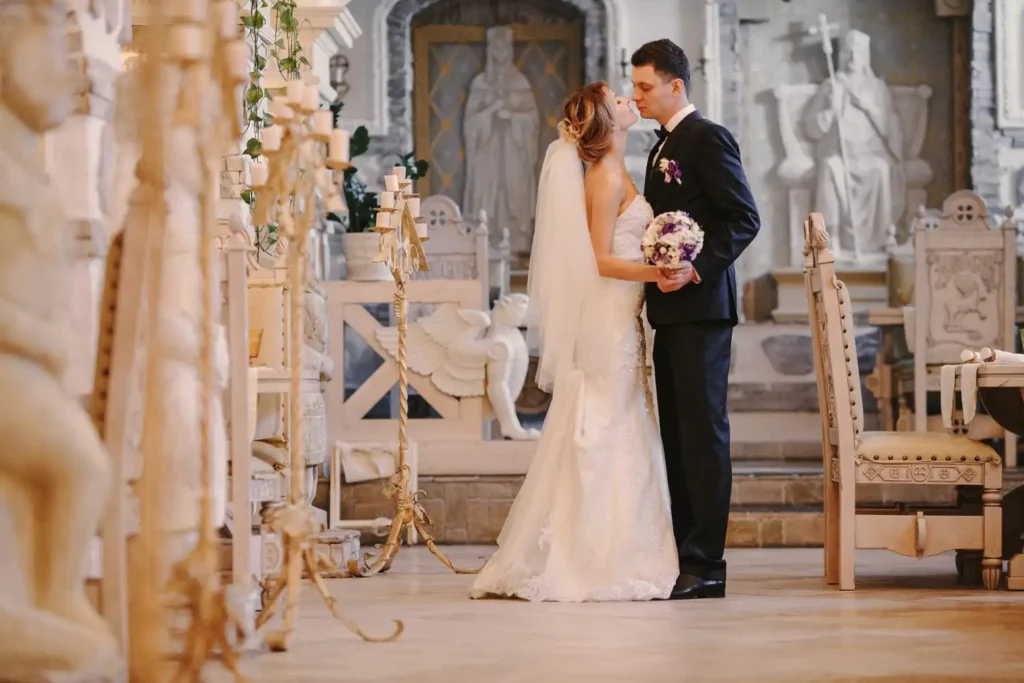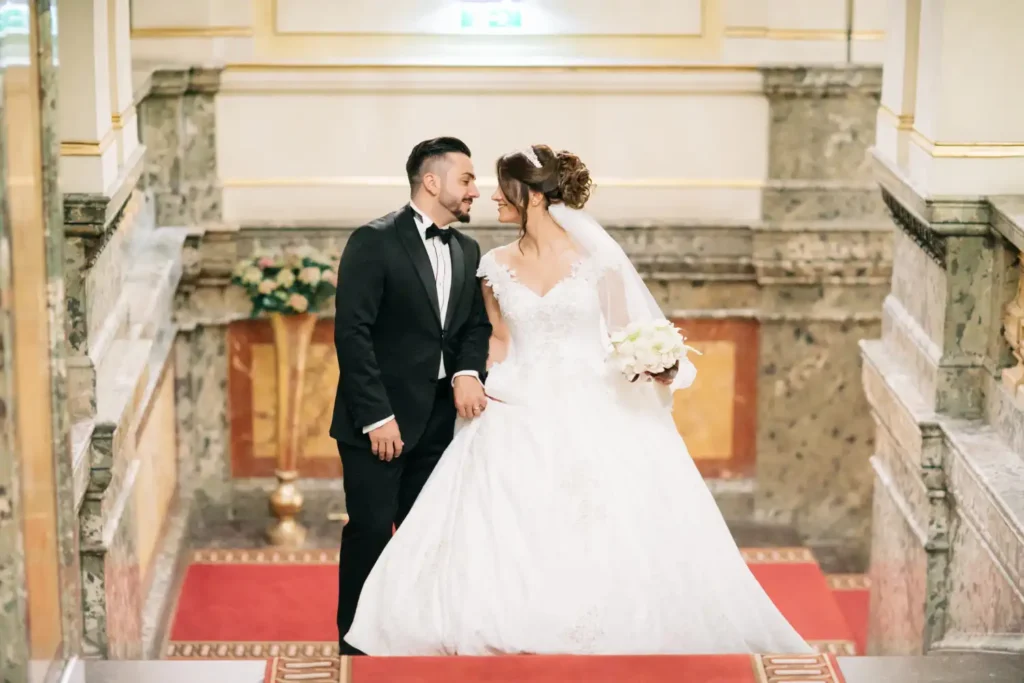Email: info@promesse.uk
Phone: +44 7710 621141

Planning a church wedding? Discover the average church wedding cost in the UK for 2025, from basic fees to hidden extras. Get tips on saving money, breakdowns, and comparisons to make your big day affordable and special without breaking the bank.
The church wedding cost can feel like a complete mystery whenever you dream about that beautiful day, where bells are ringing and people are cheering. You probably dream of walking down a beautiful aisle in an elegant old church, but then you start to worry: How much is it all going to cost?
Don’t worry, this article is designed to help you follow along step by step, giving you actual numbers based on the 2025 year, as well as tips on how to save money and how to avoid surprises. By the end of this post, you will know exactly how to plan a beautiful church wedding that suits your budget, and you will have answered the question “Can we afford this?” without losing the magic.

Let’s start with the big picture. In the UK right now, the average cost for a full wedding sits around £20,000 to £23,000. But if you’re set on a church ceremony, you’re in luck—it’s often one of the cheaper options out there.
For 2025, a basic church wedding can start as low as £500 to £1,500 just for the ceremony basics. That includes the church fee, the vicar, and your marriage certificate. Suppose you add in catering and a simple reception, the total jumps to about £5,480 on average. Compare that to a fancy venue wedding, which can hit £11,000 or more, and you see why churches are a smart pick for couples watching their pennies.
Naturally, where you live will make a difference. In major cities like London, costs will likely creep up because of the demand. But in smaller towns, your costs may even be lower. One couple I spoke to in the Midlands had their total day cost under £4,000, as they went for a local parish church they were familiar with.
To understand your wedding budget, let’s break the costs down into easy-to-follow sections. This will allow you to see where the money goes and where you can save.
First up, the legal fees. If you’re marrying in your home parish, expect to pay up to £567 in 2024 numbers, but with a small bump for 2025, it might be around £600. Marrying elsewhere? That goes up to about £675. These cover the banns (that’s the public announcement of your wedding) and the certificate.
Then there’s the church itself. Many ask for a donation or fee of £200 to £500 to use the space. Some include extras like heating or a verger (the person who helps run things on the day).
Don’t forget the officiant—the vicar or priest. Their fee is often built into the legal cost, but you might tip them £50 to £100 as a thank you.
Music adds charm but also cash. An organist could cost £100 to £200, and if you want bells ringing, that’s another £50 to £150.
| Cost Item | Average Range (UK 2025) |
|---|---|
| Legal Fees | £567 – £675 |
| Church Donation | £200 – £500 |
| Officiant Tip | £50 – £100 |
| Organist/Music | £100 – £200 |
| Bells | £50 – £150 |
| Total Basic Ceremony | £967 – £1,625 |
This doesn’t include decor or flowers yet—more on that soon.

Not all church weddings cost the same. A few things can push the price up or down, and knowing them helps you plan smart.
Location is key. In busy areas like the South East, churches might charge more because of high demand. But in quieter spots, like rural Wales or Scotland, you might find deals under £400 for the basics.
The size of your guest list matters too. More people mean bigger reception costs, even if the ceremony stays cheap. Consider chairs, programs, and extra cleaning fees.
Time of year plays a role. Summer weddings are popular, so prices for add-ons like flowers or photographers go up. Pick a winter date, and you could save 20% or more on everything.
Limits on church restrictions can be tricky. Some will tell you that you must use their organist or florist, which boxes you in, but also makes life easier. Others will allow you to use your own organist or florist, which could save you some money.
I spoke to some friends who have gotten married, and one huge thing that I learned is how much you are able to contribute. One anecdote to note is when it comes to DIYers, to couples that DIY the whole way and have to budget for professionals, just how much money they save!
Ah, the sneaky ones—these can turn a budget dream into a surprise nightmare. Let’s shine a light on them so you stay prepared.
First, pre-marital classes. Many churches ask couples to attend sessions, which might cost £50 to £200.
Then, decorations. Churches often have rules on what you can add, but flowers, pew ends, and candles add up to £200-£500 easily.
Travel and parking— if your church is out of town, guests might need help with that, or you pay for shuttles.
Insurance is a biggie. Wedding insurance covers mishaps like bad weather or vendor no-shows, costing £100-£300.
Don’t overlook tips and gratuities. From the verger to the choir, small £20-£50 gifts add up.
And alterations for your dress or suits—budget £100-£200 for tweaks.
One hidden gem from a bride I know: Church halls for receptions. They’re cheap at £15 per hour, but book early!

Want to keep your church wedding cost low without skimping on joy? Here are some fresh ideas that go beyond the basics.
Go for off-peak times. A Friday or weekday wedding can slash venue and vendor fees by 10-20%.
Use artificial flowers instead of real ones. They look great and cost half as much.
Pick a church with an on-site hall for the reception. It saves on travel and keeps things cozy.
Bundle services. Some churches partner with local vendors for discounts—ask your vicar.
From my own circle, one couple saved by having a potluck reception. Guests brought dishes, turning it into a fun community event.
Thinking about whether a church wedding is better than a quick civil ceremony? Let’s compare.
Civil weddings at a registry office can range from £50-200 for the basics, which makes them very good value – no rules, more locations, and typically faster too.
But church weddings bring tradition and that special feel, costing £500+ but still affordable compared to full venues. They include the ceremony space, which civilians might not.
Pros of church: Meaningful, often includes music, family-friendly.
Cons: More rules, potential extra fees.
Civils win on flexibility and low cost, but lack the wow of a church aisle.
One fresh take: Some couples do a civil for legal stuff, then a church blessing—best of both, but watch double costs.
Estimates run from £500-£1,500 for the basics and £5,480 if you want a reception too.
Early planning for honeymoon insurance, tips, decor, etc. Use DIY and consider an off-peak wedding date.
Church has more upfront costs as they’re a location, but include some venue perks in the cost; a civil wedding is generally less than £200.
Location, number of guests, what time of the year, and extras like music.
Choose a weekday, DIY your decor, see if you can do your reception at the church hall, etc.

A church wedding does not need to cost a fortune! If you make some intelligent decisions related to your wedding budget and stay focused on what matters most to you, you can have a great day with lots of love, joy, and family members and friends. Whether you spend money on flowers or make things simple, the only thing that matters is to have fun, not perfection!
So where do you go from here? Let us know your own experiences of church wedding costs in the comments, we’d love to know! If you are looking for more ideas, check out our related posts on affordable weddings, or if you want cheat sheet tips straight to your inbox, sign up to our newsletter. We can’t wait to see your dream day come to fruition!
Join our weekly newsletter and get the latest wedding trends, expert planning tips, and elegant inspiration delivered straight to your inbox.
No spam, no fluff - just beautifully curated content for modern couples.